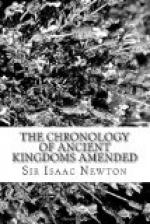The Europeans, had no Chronology before the times of the Persian Empire: and whatsoever Chronology they now have of ancienter times, hath been framed since, by reasoning and conjecture. In the beginning of that Monarchy, Acusilaus made Phoroneus as old as Ogyges and his flood, and that flood 1020 years older than the first Olympiad; which is above 680 years older than the truth: and to make out this reckoning his followers have encreased the Reigns of Kings in length and number. Plutarch [4] tells us that the Philosophers anciently delivered their Opinions in Verse, as Orpheus, Hesiod, Parmenides, Xenophanes, Empedocles, Thales; but afterwards left off the use of Verses; and that Aristarchus, Timocharis, Aristillus, Hipparchus, did not make Astronomy the more contemptible by describing it in Prose; after Eudoxus, Hesiod, and Thales had wrote of it in Verse. Solon wrote [5] in Verse, and all the Seven Wise Men were addicted to Poetry, as Anaximenes [6] affirmed. ’Till those days the Greeks wrote only in Verse, and while they did so there could be no Chronology, nor any other History, than such as was mixed with poetical fancies. Pliny, [7] in reckoning up the Inventors of things, tells us, that Pherecydes Syrius_ taught to compose discourses in Prose in the Reign of Cyrus, and Cadmus Milesius to write History._ And in [8] another place he saith that Cadmus Milesius_ was the first that wrote in Prose_. Josephus tells us [9] that Cadmus Milesius and Acusilaus were but a little before the expedition of the Persians against the Greeks: and Suidas [10] calls Acusilaus a most ancient Historian, and saith that he wrote Genealogies out of tables of brass, which his father, as was reported, found in a corner of his house. Who hid them there may be doubted: For the Greeks [11] had no publick table or inscription older than the Laws of Draco. Pherecydes Atheniensis, in the Reign of Darius Hystaspis, or soon after, wrote of the Antiquities and ancient Genealogies of the Athenians, in ten books; and was one of the first European writers of this kind, and one of the best; whence he had the name of Genealogus; and by Dionysius [12] Halicarnassensis is said to be second to none of the Genealogers. Epimenides, not the Philosopher, but an Historian, wrote also of the ancient Genealogies: and Hellanicus, who was twelve years older than Herodotus, digested his History by the Ages or Successions of the Priestesses of Juno Argiva. Others digested theirs by those of the Archons of Athens, or Kings of the Lacedaemonians. Hippias the Elean published a Breviary of the Olympiads, supported by no certain arguments, as Plutarch




